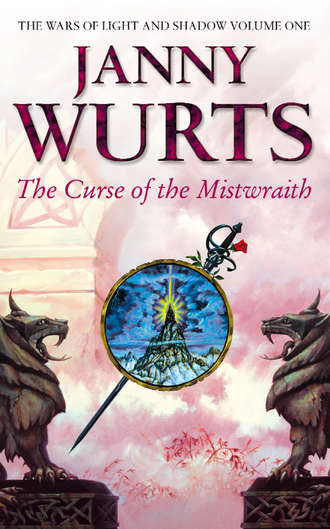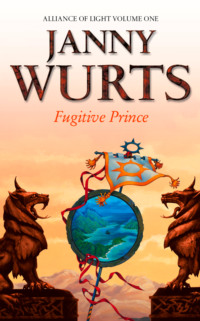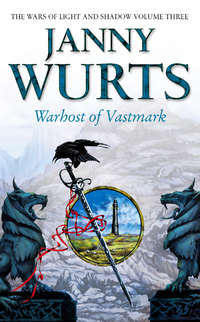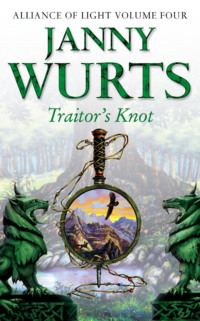
Полная версия
Curse of the Mistwraith
This drew a gasp from Felirin who knew at least a dozen ballads made in praise of the Sunlord’s long reign.
Asandir smiled. ‘May the memory of those days never fade. Yet Cianor Sunlord did little but possess the sword. He assumed the Paravian crown in Second Age 2545, and as others before him, took up the king’s blade out of preference. By then Alithiel carried a second name, Dael Farenn, or kingmaker, because three of her bearers had succeeded the end of a royal line.
‘But if the sword brought kingship to her wielder, she never became a cherished possession. Awkward size made her handling a burden and though the Isaervian blades that survived the mishaps of time were coveted, no Paravian lord cared to claim one that carried a tragic reputation.
‘Cianor eventually awarded Alithiel to a man, for valour in defence of his sister, Princess Taliennse. Her Grace was rescued from assault by Khadrim in the very pass we just crossed.’ Here Asandir nodded in deference to Arithon. ‘The emerald in your sword was cut by a sunchild’s spells. The initial in the leopard crest changes with the name of the bearer, and since the blade fits the hand of a man to perfection, each heir in your family has carried her since.’
Asandir folded long hands. ‘Arithon, yours is the only Isaervian blade to pass from Paravian possession. To my knowledge, she is the last of her kind on the continent.’
Lysaer regarded the polished quillons with rueful appreciation. ‘Small wonder the armourers of Dascen Elur were impressed. They held that sword to be the bane of their craft, because no man could hope to forge its equal.’
Asandir rose and stretched like a cat. ‘The centaur Ffereton himself could not repeat the labour. If, in truth, he still lives.’
Felirin raised dubious eyebrows. ‘Did I hear right? Could a centaur be expected to survive for eighteen thousand years?’
The sorcerer fixed the bard with a bright and imperious sadness. ‘The old races were not mortal, not as a man might define. The loss of the sun touched them sorely, and even my colleagues in the Fellowship can’t say whether they can ever be brought to return. The tragedy in that cannot be measured.’
A stillness descended by the fireside, broken by Asandir’s suggestion that all of them turn into their blankets. The weather was shortly going to turn, and he wished an early start on the morrow. Arithon alone remained seated, the sword handed down by his ancestors braced in its sheath across his knees. The flames flickered and burned low and subsided at last to red embers. Hours later, when the others seemed settled into sleep, he put the blade aside and slipped out.
Mist clung in heavy, dank layers beneath the evergreens, and the darkness beyond the cave was total. Yet Arithon was Master of Shadow: from him, the night held no secrets. He walked over rocks and roots with a catsure step and paused by the rails that penned the horses.
‘Tishealdi,’ he called softly in the old tongue. ‘Splash.’
The name fell quiet as a whisper, but movement answered. An irregular patch of white moved closer and a muzzle nosed at his hand; the dun, come begging for grain. Arithon reached out and traced the odd marking on the mare’s neck. Her damp coat warmed his cold hands and the uncomplicated animal nearness of her helped quiet the turmoil in his mind. ‘We can’t leave, you and I, not just yet. But I have a feeling we should, all the same.’
For he had noticed a thing throughout Asandir’s recitation: while in the presence of the bard, the sorcerer took care to avoid any mention of his, or Lysaer’s surname.
The mare shook her head, dusting his face with wet mane. Arithon pushed her off with a playful phrase that died at the snap of a stick. He spun, prepared for retreat. If Dakar or the sorceror had followed him, he wanted no part of their inquiries.
But the accents that maligned the roots and the dark in breathless fragments of verse were the bard’s. A bump and another snapped stick ended the loftier language. ‘Daelion’s judgement, man! You’ve a miserable and perverse nature to bring me thrashing about after you and never a thought to carry a brand.’
Arithon loosened taut muscles with an effort concealed by the night. ‘I don’t recall asking for company.’
Felirin tripped and stumbled the last few yards down the trail and fetched against the fence with a thud that made the boards rattle. The dun shied back into the snorting mill of geldings, and the grey, confined separately, nickered after her.
The bard looked askance at the much-too-still shadow that was Arithon. ‘You’re almost as secretive as the sorcerer.’
Which was the nature of a spirit trained to power, not to volunteer the unnecessary; but Arithon would not say so. ‘Why did you come out?’
Felirin returned a dry chuckle. ‘Don’t change the subject. You can’t hide your angst behind questions.’
Arithon said nothing for an interval. Then with clear and deliberate sting he said, ‘Why not? You know the ballads. Show me a hero and I’ll show you a man enslaved by his competence.’
The bard took a long, slow breath. A difficult man to annoy, he had neatly and nearly been goaded to forget that Arithon’s mettlesome nature defended a frustrated talent. ‘Listen to me,’ Felirin said quickly. An honest desperation in his entreaty made Arithon ease off and give him space. ‘Promise me something for my foolishness. There’s a singer, a Masterbard, named Halliron. If you meet him, I beg you to play for him. Should he offer you an apprenticeship, I ask for your oath you’ll accept.’
Silence; the footfalls as curious horses advanced from the far side of the corral. Then a chilly gust of air rattled through the trees. Arithon pushed off from the fenceboards and cursed in an unfamiliar language through his teeth. ‘Like sharks, you all want a part of me.’ His voice shook; not with fury, but with longing.
Felirin smiled, his relief mixed with guilt-tinged triumph. ‘Your oath,’ he pressured gently. ‘Let me hear it.’
‘Damn you,’ said Arithon. In a shattering change of mood, he was laughing. ‘You have it. But what’s my word against the grandiloquent predictions of a maudlin and drunken prophet?’
‘Maybe everything,’ Felirin finished gently. ‘You’re too young to live without dreams.’
‘I wasn’t aware that I didn’t.’ Lightly firm in his irony, Arithon added, ‘Right now, I wish to go to bed.’ He walked away, left the bard to thwarted curiosity and the crowding attentions of the horses.
Backtrail
On the downs of Pasyvier, by the flames of a drifter’s fire, a seer speaks sharply to a grande dame returned from the autumn horse fair. ‘Say again, you saw a sorcerer? And with him a blond-haired stranger who spoke the speech of the true-born? I tell you, if you did, there will be war…
In the hall of judgement in West End, seated on his chair of carved oak and carnelian, a town mayor listens, sweating, to a similar description from the half-wit who played fiddle in the square…
Under mist in the Peaks of Tornir, a wild, screeling wail calls Khadrim in retreat back to spell-warded sanctuary; and the harmonics ring of death by spell-cursed steel not seen for a thousand years…
VI. ERDANE
The walls of Erdane had been raised at the crossroads two ages before the uprising which threw down the high kings had bloodied its maze of narrow streets. Now, five centuries later, the city wore change like a tattered, overdressed prostitute. Guild flags and a mayor’s blazon fluttered over the Grand West Gate, built by Paravian hands of seamless, rose-veined quartz. The stone at street level was left pitted and scarred by siege-weapons, and greyed by the passage of uncounted generations of inhabitants. Had the sentries in the mayor’s guard been as vigilant as their counterparts in times past, they would have challenged the woman in the shepherd’s cloak who passed the gatehouse, hooded. Boots of sewn sealhide showed beneath her ankle-length skirts, but their soles were not made for walking. Her hands were calloused from the bridle-rein, and her eyes a clear and disturbing grey.
But the captain of the watch barely glanced up from his dice game and the teenaged soldier who lounged on his javelin stayed absorbed by a whore, who paraded her bedizened attractions for the eyes of a loud-voiced drover.
Elaira, Koriani enchantress and message-bearer for the Prime, entered Erdane unremarked between a wagon bearing three sows and the rumbling wheels of an aleseller’s dray. She was the first of her kind to pass the city gates for close to four hundred years and the only one to try without any sanction from her seniors. Had she been recognized for what she was, she would have been stripped and publicly burned after barely a pretence of a trial.
Other women had suffered that sentence inside the past half-decade. If the mayor of Erdane suspected the charges against those accused were false, his conscience never bothered his sleep. What troubled his guildmasters and council to cold sweats was the fear that powers from the past might arise out of legend and claim vengeance. For unlike the commoners and the craftsmen, the Lord Elect of Erdane had access to archives that detailed a history of conspiracy and murder. To him, to his council and his general of armies, the sun was no myth, but a harbinger of sorcery and certain doom.
Elaira was cognizant of the risks. She kept her knotworked hood pulled low over her forehead and took care not to pass between the flirtatious whore and her sources of male attention. When the ale dray pulled up precipitously to avoid a running urchin, the enchantress ducked out of the main thoroughfare. She hastened down streets of marble-fronted guild-halls, threaded across the artisans’ district, then turned through a moss-dark arch.
The alley beyond was barely wider than a footpath. Fallen slates and rat-chewed ends of bone clogged the gutters. Seepage dripped in mournful counterpoint to the moss-crusted planks of half-rotted, open-air stairways; and from spell-charmed strips of tin nailed up to ward off iyats. Unlike many such talismans, these held true power to guard. Elaira could sense the faint resonance of their protections as she wound her way past ill-smelling puddles and locked shutters.
This slum by the edicts of town law should never have managed to survive: it had no wineshops or pot-traders on the lower levels. Dirty children did not play in the gutters, and drunks did not snore off binges; whores sought no customers here, nor did headhunters with old campaign scars loiter between assignments to boast of kills. This was a street whose inhabitants Erdane’s mayor sorely wished to eradicate; except that in the teeming maze of the wall district, its location was most difficult to know. Wayfarers came seeking the archway and found themselves inexplicably side-tracked. They might blink and miss the entry, or be distracted by a noise or a thought; and before they had grasped they had missed something, they would have passed on by.
For anyone untrained in spellcraft to pause here, even for a second, was to become lost in a mage-worked tangle of deception.
Elaira found the stairwell with carved gryphons on the newels. This was the house; here. She had all but sold her jewel for directions. For the Koriani matron who had received the scrolls from the Prime had been garrulous enough to repeat rumour. If she was right, the mayor’s most persistent nightmare was already half-way realized: a Fellowship sorcerer and two old-blood princes were temporarily in residence within Erdane.
Elaira mounted the alarmingly shaky stairway and paused on the landing at the top. With a shiver of sinful anticipation she knocked and asked for entry. ‘Is this the home of Enithen Tuer?’
A muffled clang, then the ring of a bar being drawn back; the door cracked and a white-lashed milk-pale eye peered through. ‘Ath’s Avenger, it’s a witch,’ rasped a reedy, aged voice. ‘Girl, you’re very brave or just stupid.’
Elaira tightened her grip on her cloak laces. ‘Probably stupid.’ She held back a nervous laugh. ‘Are you going to let me in?’
The eye blinked. ‘I will. You may be sorry.’
‘I will be sorry.’ Elaira threw an unsettled glance over her shoulder; the alley remained empty, dimming rapidly in the falling dusk. Nobody watched from the rows of shuttered windows. Still, her proscribed visit would be noticed very fast if she tarried too long in the open. As the door creaked wider, Elaira stepped through in a rush that betrayed apprehension.
A tiny, hunchbacked crone bounced backward out of her path. ’Yeesh. Came here without sanction, did you?’
Elaira pushed back her hood. The room did not match the alley’s run-down squalor but was snug and comfortably furnished. Candles lit the enchantress’s face like a cameo against the purple-black silk of a second cloak concealed underneath the rougher wool. Inside, somewhat mussed by the muffling layers, coiled a braided knot of bronze hair. ‘Maybe I just want my fortune told.’
The crone grunted. ‘Not you. And anyway, you don’t need a seer to tell your future’s just branched into darkness.’
‘Sithaer,’ Elaira sucked an unsteady breath. ‘So soon?’ She fumbled at the ties of her wraps and caught sight of two young men who watched her, interested, over a half-completed game of chess.
Elaira’s eyes widened. They were here! And unmistakably royal, the bloodlines perpetuated over many generations still apparent as the nearer one rose to meet her. Light from the sconces edged pale s’Ilessid hair in shining gold. The prince possessed an elegance that went beyond his handsome face. His eyes were jewel-blue. He carried his well-knit frame with the dignity of a man schooled perfectly to listen, and a pride unselfconscious as breathing.
‘Lady, may I?’ he asked in courtly courtesy; and hands tanned dark by alien suns reached out and slipped the shepherd’s cloak from her shoulders.
Unused to male solicitude, Elaira blushed and evaded his smile, and found her sight drawn to the other prince, whose black hair at first glance had caused him to blend into shadow.
This one regarded her with eyes of s’Ffalenn green, and something else: the still, small shock of an awareness that recognized power. Elaira repressed stark surprise, while the s’Ilessid prince said something polite that her mind interpreted as background noise.
Before she could recover the poise to apply her trained skills to draw intuitive deductions through observation, the seer, Enithen Tuer, caught her elbow. Crabbed hands spun her toward a doorway which opened to reveal the Fellowship sorcerer she had defied her order’s strictures to visit.
Asandir proved taller than Elaira had expected from images garnered through lane-watch. Lean as toughened leather, he wore plain clothing with a bearing she had always before thought imperious. In person, she revised that to a stillness that brooked no wasted motion. His hands were still also, the straight, tapered fingers clean as bleached bone on the latch. The face beneath the trimmed silver hair was carved by years and experience to a fierce mapwork of lines. The eyes in their deep-set sockets regarded her with a serenity that unnerved and exposed.
‘What brought you here, Elaira of the Koriathain?’ said Asandir of the Fellowship of Seven.
‘She wasn’t sent,’ the seer interjected. A palsied nudge sent the enchantress forward toward the imposing figure in the doorway.
‘I see that.’ As if aware that the leashed force in him intimidated, Asandir caught Elaira’s elbow and steered her toward a chair. His touch was light as a ghost’s, gone the instant it was noticed as he stepped back and away and closed the door.
Elaira sat for lack of the nerve to do otherwise. Feeling nakedly foolish, she buried unease in a study of her surroundings. The room was crowded with shelves, a work-place that smelled of herbs, and waxed wood and oiled wool; a basket of carded fleece sat in one corner, beside the worn frame of a spinning wheel. The woven rug underfoot had faded with age to a muddle of earth tones and greys, and the walls were piled high with crates of yarn and old junk.
‘What brought you here, lady?’ the sorcerer asked again. He bent with a servant’s unobtrusiveness and began to build up the fire. Flame brightened as the birch logs caught and lined his hard profile in light.
Elaira stared down at her boots and the muddied hem of her skirts which now gave off faint curls of steam. All the excuses, every elaborate and reasonable-sounding word she had rehearsed through the afternoon fled in the rush of her fast-beating heart. She was out of her depth. She knew it; before she could think, she spoke honestly. ‘I was curious.’
Asandir straightened up. Stern, but not unkindly, he looked at her, from her splashed skirts to her open, angular face. His eyes were penetrating, yet utterly without shadow. The awful strength behind his presence spoke of purpose rather than force. He reached out, hooked a stool from beneath the spindle and sat with his back to the lintel by the grate. Then, hands folded on his knees, he waited.
A hot rush of blood touched Elaira’s cheeks. With utmost tact and patience, he expected her to compose herself and qualify on her own. Oddly released from her awe, she unlaced shaking fingers. She slipped the violet cloak of her order over the chairback and tried to assimilate the particular that, unlike a Koriani senior, this sorcerer would pass no judgement upon her; no debt would be set on her demands.
She gathered her nerve and blurted, ‘I wanted to see, to know. If the Prophecy of West Gate was filled, and whether Desh-thiere’s Bane has come at last to Athera.’
Asandir regarded her, unblinking. ‘You passed its substance on the way in.’
He would elaborate nothing unless she pressed him. Her betters insisted as much, endlessly: Fellowship sorcerers gave up nothing freely. Eager to test that platitude for herself, Elaira dared a question. ‘I observed that the Teir’s’Ffalenn has been initiated to the disciplines of power. Is this what gives him ability to dominate the Mistwraith?’
Asandir straightened, sharpened to sudden attention. ‘That took both initiative and courage, neither one a praiseworthy attribute in the entrenched opinion of your sisterhood.’ He smiled in gentle humour. ‘I intend to give you answer, Elaira, but in the expectation you will treat the information with a foresight your superiors might hold in contempt.’
Elaira suppressed astonishment, that a Fellowship sorcerer in his multiple depths of power might share frustration with her colleagues’ preoccupation with the present.
But her interest was cut short as Asandir said, ‘In the times of the rebellion, when four of the high kings’ heirs were sent to safety through West Gate, the Fellowship granted foundational training to the Teir’s’Ahelas to increase her line’s chances of survival. Her descendants on Dascen Elur continued her tradition but forgot certain of the guidelines. In the course of five centuries of isolation, the mages there achieved what the Seven could not.’
‘Is that possible?’ Elaira interjected.
Asandir’s silvered brows tipped up. ‘What is possible does not always coincide with what is wise.’
Instantly Elaira felt stupid.
And yet, perversely, instead of rebuke for her thoughtless words, Asandir chose to explain the bride-gift which granted two men an inborn command of elemental mastery. ‘Together, our princes can vanquish Desh-thiere. Separately, you must know, their gifts might potentially inflict greater harm than the wraith their powers must defeat.’
Arrogance did not admit fallibility and reticence did not offer explanation; about the Fellowship, the Koriani Senior Circle was emphatically mistaken. Just accorded the insight of a colleague or an equal, Elaira sat stunned and still.
‘You have noticed in the Teir’s’Ffalenn a familiarity with the inner disciplines,’ Asandir continued, his eyes turned down toward his hands. ‘He spent his boyhood with the s’Ahelas mages, and their teaching was not wasted on him. One can hope that the sensitivity inherent in his lineage will keep his eyes opened to responsibility. In that, he will have all the support the Fellowship can offer.’
Floundering through a quicksand of overturned beliefs, Elaira said, ‘Then the success of Dakar’s prophecy is not assured?’
‘Could it be? Men created Desh-thiere. The hands of men must bring it down. Exchanges of power on that scale are never bought without peril. Athera must endure the price. And your question has been answered now, I think.’
In response to his note of finality, Elaira rose from her chair. She gathered her violet cloak, her normally impertinent nature repressed behind a frown.
As if attuned to her thoughts about him, Asandir said, ‘Your order has ever been dedicated to intolerance.’
Elaira steeled herself and looked up into those terrifying, unruffled eyes. ‘My seniors hate to admit to incompetence.’
‘Lesser strength does not add up to uselessness.’ The sorcerer crossed the room.
The enchantress followed, reluctant. ‘Our First Enchantress to the Prime, Lirenda, would disagree.’
Asandir regarded her as he lifted the doorlatch. ‘But you are different.’
He warned her. Elaira understood as much as he guided her through the door with the same feather-touch that had admitted her; as if his hands innately knew their capacity to unleash cataclysm, and in wariness adhered to gentle opposite. She would do well to apply the same principle and curb her outspoken brashness.
‘You have a clear eye for truth,’ the sorcerer said. ‘Don’t replace one mistaken set of principles for others as narrow-minded.’
Elaira quailed before the thought that Asandir had credited her with far too balanced a mind. She was not impartial where her seniors were concerned; and yet that seemed what this sorcerer expected her to become. She crossed the outer room, where the chess board had been set to rights and two chairs now stood empty. The seer Enithen Tuer sat in her rocker, blinking clouded eyes through the smoke of an aromatic pipe. If the crone saw past a dark and tangled future, she offered no advice as the younger enchantress gathered up her shepherd’s cloak and quietly let herself out.
Night had fallen, dense in the absence of any lamps. Elaira’s progress down on the moss-caked stair became careful and slow with uncertainty. She had taken on more than she bargained for. As she applied the nuances of her training to analyse the interview in retrospect, she realized how easily Asandir had tuned her expectations, lulled her sense of caution with a touch of human fragility and an air of attentive solicitude. Now, aware in the chill of the alley how subtly she had been pushed to think beyond her limits, the enchantress shivered outright. The sorcerer had not used her. But he could have, deftly as a potter turning unformed clay on a wheel.
The Prime Circle’s obstinate fears were not in the least bit unfounded.
Elaira roused herself, mechanically continued until she reached the base of the stair. Asandir had warned of consequences. Through queasy, unsettled nerves, the enchantress who had dared the unthinkable sorted out the single thread that mattered. A Fellowship sorcerer had trusted her. Why remained a mystery, but were she to reveal what she had learned – that the Mistwraith’s bane rested solely in the hands of two men bred to rule, and that the Fellowship itself could not directly limit the result – the Koriani Prime Circle would be roused to bitterest anger, or worse, outright obstruction.
Elaira kicked a loose piece of slate; her boots sloshed through puddles with only minimal awareness of the wet. She could not escape a reprimand; if under questioning by her seniors she were to conceal that her knowledge of the two princes had derived from a confidence shared by Asandir, some other escapade must replace it. Before the enchantress on watch duty touched her presence she must contrive another circumstance to match the surface facts. Or else the larger truths that she had most unwisely asked to know could not possibly be kept hidden.







